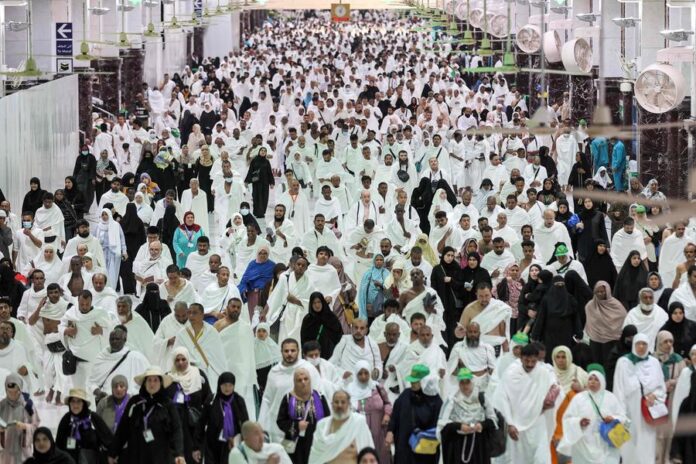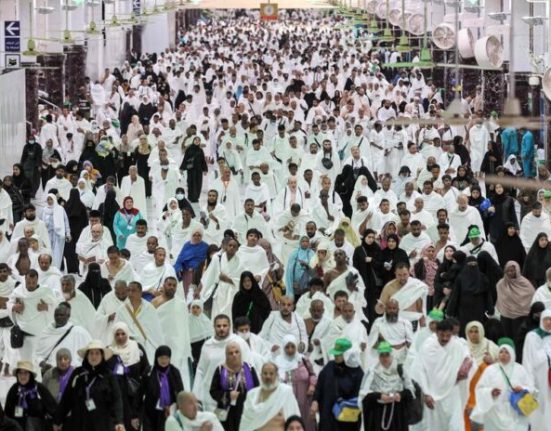In what is regarded as the spiritual journey of a lifetime, millions of Muslim faithful from across the globe have begun converging on the holy city of Mecca in Saudi Arabia for the annual Hajj pilgrimage, a profound religious obligation deeply rooted in Islamic faith and heritage.
For many Nigerian Muslims and their counterparts worldwide, this pilgrimage is more than just a religious rite; it is a sacred milestone that fulfills one of the Five Pillars of Islam. Alongside the declaration of faith (Shahada), daily prayers (Salat), almsgiving (Zakat), and fasting during Ramadan (Sawm), Hajj is obligatory at least once in the life of every Muslim who is financially and physically able to undertake it. Some, out of deeper devotion, embark on the pilgrimage multiple times.
Hajj takes place during Dhul-Hijja, the twelfth and final month of the Islamic lunar calendar. This year, the pilgrimage is scheduled to begin on June 4, drawing pilgrims from diverse nations, races, and socioeconomic backgrounds, all dressed in simple white garments symbolizing purity, equality, and unity before God.
Pilgrims enter a sacred state known as ihram, which imposes specific spiritual and physical disciplines. For men, this includes wearing two unstitched white cloths, refraining from shaving, and abstaining from quarrels or inappropriate behavior. Women, too, adopt modest clothing and similar restrictions as a way of setting aside worldly distractions and focusing entirely on spiritual submission.
Among the many powerful moments of Hajj is the standing at Arafat, known as Wuquf, which is considered the pinnacle of the pilgrimage. Pilgrims gather on the plains of Arafat, where they raise their hands, shed tears, and beseech God for forgiveness and mercy, following in the footsteps of the Prophet Muhammad (peace be upon him), who delivered his final sermon at that site.
Another iconic ritual is the tawaf, which involves circling the Kaaba, the cube-shaped structure at the heart of the Masjid al-Haram in Mecca, seven times in a counterclockwise direction. This powerful act is performed by millions, all united in devotion, as the Kaaba represents the direction Muslims face during their five daily prayers, no matter where they are in the world.
Despite its spiritual rewards, the Hajj journey is not without challenges. The intense heat of the Saudi summer, particularly in recent years, has led to health concerns. Last year alone, over 1,300 deaths were reported during the pilgrimage due to heat-related complications, especially among unauthorized pilgrims who undertook the journey without proper arrangements and permits, often walking long distances under the scorching sun.
For many pilgrims, especially those from countries like Nigeria where the cost and logistics of travel can be formidable, Hajj is the culmination of years of prayer, savings, and preparation. Families often pool resources, and prospective pilgrims may spend months attending educational sessions to learn the rites of Hajj and how to spiritually prepare for what they consider a transformative experience.
As pilgrims carry personal prayers, the hopes of their families, and a longing for spiritual renewal, the global Muslim community prepares to mark Eid al-Adha, the Festival of Sacrifice, which coincides with the culmination of the Hajj. This significant Islamic holiday commemorates the willingness of Prophet Ibrahim (Abraham) to sacrifice his son in obedience to God’s command, a test of faith that ended with divine intervention and the replacement of the son with a ram.
Eid al-Adha is observed by Muslims around the world through prayers, festive gatherings, and the ritual sacrifice of livestock, with the meat often distributed to the needy, a powerful symbol of charity, gratitude, and community.
The pilgrimage and the festival together embody the essence of Islamic faith: devotion, discipline, sacrifice, and unity. As millions gather in Mecca in one of the world’s largest annual religious gatherings, the spiritual reverberations of Hajj are felt far beyond the desert sands of Saudi Arabia, including in towns, cities, and villages across Nigeria and the wider Muslim world.

